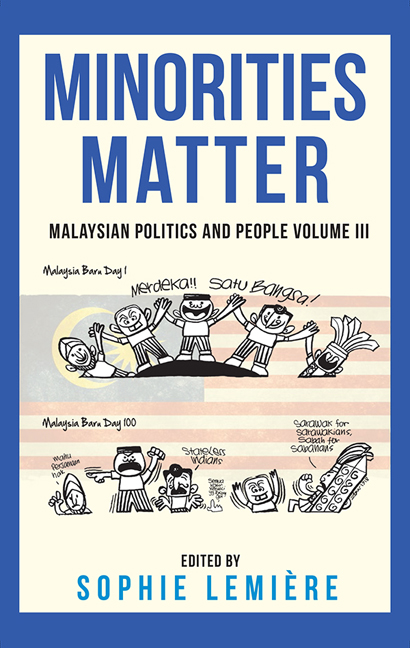Book contents
- Frontmatter
- Contents
- Acknowledgements
- Foreword
- Introduction
- Part I Engaging Politics: The Role of Minorities in GE14 and Beyond
- 1 Local Elections, Decentralisation, and Institutional Reform
- 2 ‘Where's Our #30peratus’: A Feminist Critical Discourse Analysis of Twitter Debates on Women's Political Representation
- 3 Romantic Whispers: When Relationships Mobilise Political Agency in the Sabah Elections
- 4 The Orang Asli in GE14: Towards Meaningful Political Engagement?
- 5 The 1963 Malaysia Agreement (MA63): Sabah and Sarawak and the Politics of Historical Grievances
- Part II Building Democracy: Malaysia Baru and the (Im-)possible Reform
- List of Contributors
1 - Local Elections, Decentralisation, and Institutional Reform
from Part I - Engaging Politics: The Role of Minorities in GE14 and Beyond
Published online by Cambridge University Press: 25 January 2020
- Frontmatter
- Contents
- Acknowledgements
- Foreword
- Introduction
- Part I Engaging Politics: The Role of Minorities in GE14 and Beyond
- 1 Local Elections, Decentralisation, and Institutional Reform
- 2 ‘Where's Our #30peratus’: A Feminist Critical Discourse Analysis of Twitter Debates on Women's Political Representation
- 3 Romantic Whispers: When Relationships Mobilise Political Agency in the Sabah Elections
- 4 The Orang Asli in GE14: Towards Meaningful Political Engagement?
- 5 The 1963 Malaysia Agreement (MA63): Sabah and Sarawak and the Politics of Historical Grievances
- Part II Building Democracy: Malaysia Baru and the (Im-)possible Reform
- List of Contributors
Summary
Pakatan Harapan's (PH) 2018 election manifesto pledged to ‘restore the true spirit of federalism’ and ‘strengthen the role of local authorities’ in Malaysia. This has raised expectations for decentralisation reforms and the restoration of local elections following the coalition's unexpected win in the 2018 general election. Three major obstacles, however, have prevented immediate reform. First, proper sequencing is required to avoid exacerbating the ‘missing middle’ problem. Second, lack of consensus around local elections within PH makes them potentially divisive politically, particularly because of fears, whether well-founded or not, that they may exacerbate racial tensions. Third, original survey data suggest limited enthusiasm for extensive political decentralisation among PH supporters now that Barisan Nasional has been removed from power.
Introduction
Malaysia's 14th general election (GE14) on 9 May 2018 delivered a previously all-but-unthinkable outcome: the dominant United Malays National Organisation (UMNO) and its Barisan Nasional (BN) coalition partners, which had led Malaysia since independence in 1957, were defeated at the ballot box. The ultimate causes of this turnover will be debated at length over the coming years. There is little dispute, however, about the most immediate cause: Malaysia's Prime Minister (and UMNO president) Najib Tun Razak was widely perceived as having abused his powers and engaged in massive corruption, catalysing a backlash against the status quo.
Najib's abuses were enabled, at least in part, by the highly centralised nature of power in Malaysia, where the federal level dominates over the subnational tiers (Hutchinson, 2014; Loh, 2015) and the Prime Minister's Department has amassed immense power (Ostwald, 2017a). This power concentration precipitated long-standing calls from both civil society and opposition coalitions to redistribute power, specifically to disperse it across the tiers of government. The run-up to GE14 was no different. The manifesto of the opposition coalition, known as Pakatan Harapan (PH), clearly laid out its reform agenda, including a promise to ‘Revive the true spirit of federalism’ (#24) and to ‘Strengthen the role and powers of the local authorities’ (#25) (Pakatan Harapan, 2018). The latter promise was widely read as an intention to reinstate local elections.
Reinstating local elections – which in Malaysia are often referred to as the ‘third vote’ to complement existing federal- and state-level votes – would mark a return to an earlier institutional arrangement. Limited elections for local representatives were held between 1857 and 1913, then brought back in the waning days of colonial rule in 1951.
- Type
- Chapter
- Information
- Minorities MatterMalaysian Politics and People Volume III, pp. 2 - 19Publisher: ISEAS–Yusof Ishak InstitutePrint publication year: 2019



